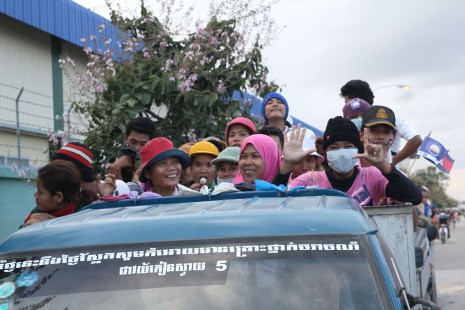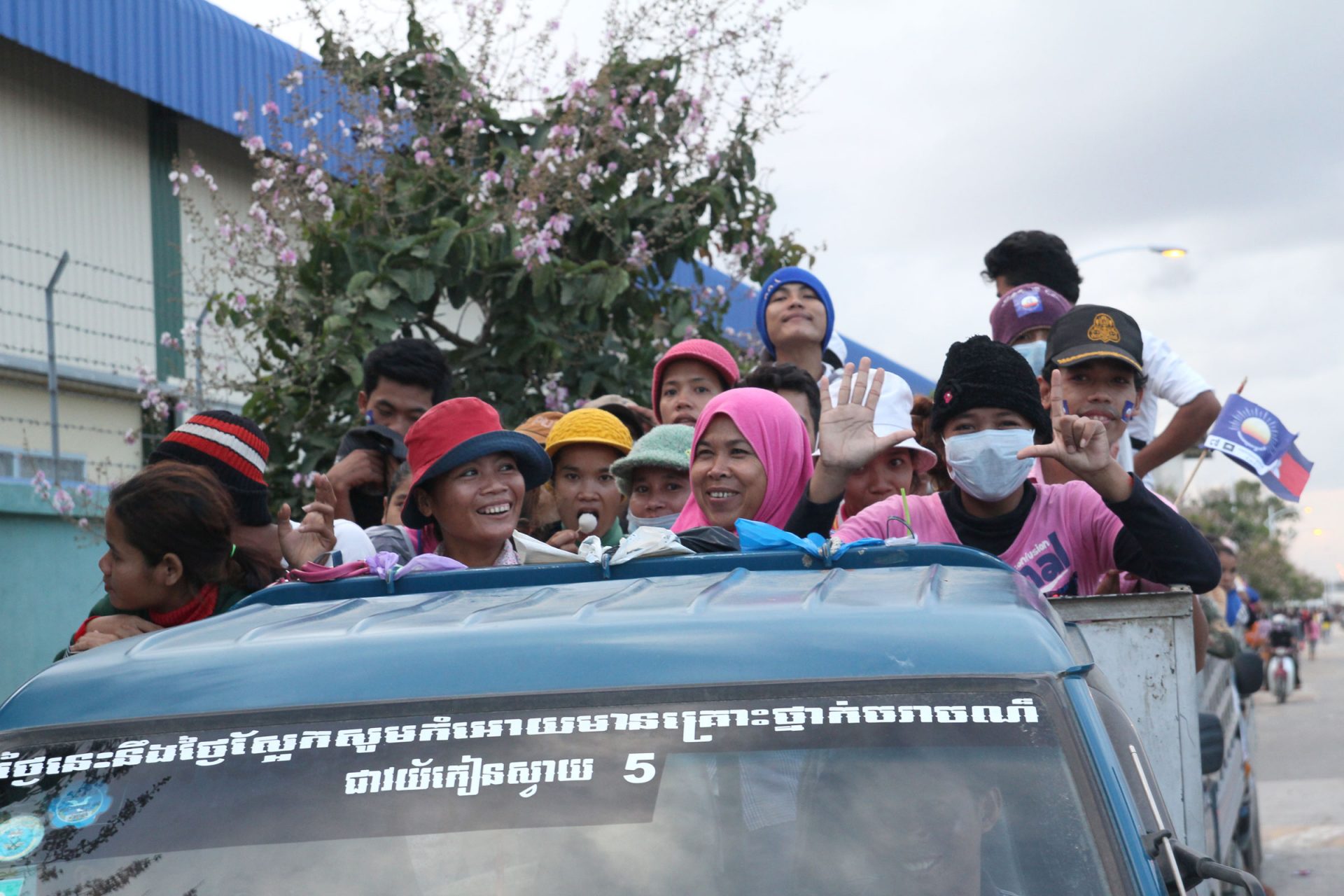In the run-up to Sunday’s national election, both the ruling CPP and opposition Cambodia National Rescue Party (CNRP) have dug deep in their arsenal of incentives to win over the largest segment of the country’s industrial workforce: garment workers.
On May 1, the government announced an increase to the minimum wage for garment workers from $61 per month to $80. And earlier this month the CPP organized a massive procession of about 500 trucks and 2,000 motorcycles carrying throngs of workers through the streets of Phnom Penh.

The CNRP has promised to increase the minimum wage to $150 per month as well as to improve poor working conditions in factories. As Cambodia’s largest manufacturing industry, with more than half-a-million workers, the garment sector has been a hotbed of profitability and problems, whether it be mass fainting episodes or widespread strike action.
And with the size of the workforce in the multibillion-dollar industry having roughly doubled since the previous election in 2008, both parties have been left scrabbling for ideas on how to soothe the disaffected.
In dozens of interviews with garment workers at factories around Phnom Penh, the message from workers is clear.
Tith Lakena, 19, a worker from Svay Rieng province employed at the Chinese-owned WKK garment factory in Meanchey district, earns between $80 and $120 per month with overtime.
But it’s not enough. She lives with six others in a small room to help her save money and come Sunday, will vote CNRP.
“If I stayed with only two people, I wouldn’t have enough money to pay for the room and utilities. We want the next elected government to lower the price of goods, increase our wages and to get rid of short-term contracts because we cannot support our family and they can fire us easily. Life is not easy for garment workers,” Ms. Lakena said. “Many of my friends are also going to vote for the CNRP.”
Still, she said that some workers in the garment sector were so hard up for cash that there are some who will forgo returning to their province to vote.
In this industrialized hub on the outskirts of Phnom Penh, garment workers break for lunch everyday at the same time. A tide of young women wearing fluorescent colored bandanas pour out of factories and sit in circles on patches of grass that line the dusty road. Fried crickets, stewed eggs and rice are passed round.
A few minutes’ walk from the factories are the workers’ homes —or what could be more accurately described as a concrete room. Consisting of a wooden platform used as a dining table during the day and a bed at night, the dwellings are humble and cramped. Families live, sleep, cook, clean and store their motorbikes in these rooms.
Standing outside her home wearing yellow pajamas with an Angry Birds print, 23-year-old Phally Tung from Kompong Cham province said she will vote CNRP because she feels the current government has failed to develop the country in the way that has happened in Thailand and Vietnam.
Her neighbor, Rotha Phorn, who has worked in a factory for a year, also feels it is time for the government to change.
“I want a higher salary and for there to be less corruption. But more money is not my main requisite; ridding Cambodia of corruption is,” she said. (The CNRP has said factories could easily raise wages for workers if corruption in the sector is reduced and taxes are dropped on petroleum.)
Hech Srey Oun from Kompong Thom province said CNRP leaders Sam Rainsy and Khem Sokha have also got her vote. Ms. Oun’s monthly rent has gone up from $22 to $25 in the past 6 months—an added financial squeeze that is making her circumstances difficult, she says.
“With the $150 per month that the CNRP has promised I can save money for my family and live better. The country needs to develop. Roads need to improve, and where I live, in Kompong Thom province, flooding is a problem. I hope if the CNRP get elected they can address that.”
Despite overwhelming support for the CNRP there was a smattering of workers who felt the CPP has kept the country stable and prosperous and a change of party could efface this.
Pang Srey Leak, 40, from Kompong Thom province, said: “I do not believe that CNRP can provide $150 because I cannot and trust the party. If we pick them, our country will turn upside down and where can we go from there? I will vote the [CPP] as I did before.”
Garments make up 80 percent of Cambodia’s exports. In the first half of the year, garment and textile exports were worth $1.558 billion, up 32 percent on the same period last year. Part of the reason for the boom in business is rising labor costs in the major garment producing countries such as China and Vietnam.
But workers feel that too much of the cash being generated from the industry is going into the pockets of investors that simply repatriate the profits and get away with paying locals a pittance.
Though unions all fought for a pay rise in negotiations with the government earlier this year, those aligned with the ruling party stopped at $93 per month, while independent and opposition-aligned unions asked for $150.
Sam Aun, president of the CPP-aligned Cambodian Labor Union Federation (CLUF), claimed that the 64 unions that make up CLUF have about 83 percent of the 640,000 people estimated to be working in garment and related industries in Cambodia.
“Workers’ salaries are suitable for their families financial situation,” Mr. Aun said.
“[Most garment workers] will vote for the CPP because they have jobs and a salary—our government leader is hard-working and during the election campaigns, it’s visible that there is no party which has as much support from garment factory workers.”
However, interviews with workers revealed many are completely unaware about which union they actually belong to.
For Chan Na, 23, and Pen Samban, 26, who both work in Uni Eastern Sportswear MFG Ltd. in Meanchey district, the name of their union or what it stands for has not been disclosed to them by factory management.
And these are not isolated cases. All of the workers interviewed said they were signed up to a union when they were employed but did not know exactly which one, or its political allegiance.
“Today, some unions are under the influence of a political party or employer—they cheat [workers] by putting their name on the list of a union without the worker knowing,” said Ath Thon, president of the Coalition of Cambodian Apparel Workers’ Democratic Union (CCAWDU)—the only independent union body in the country.
“The [union] does not have any programs to teach or educate the workers. The employer does not give them any information. There are a lot of factories that do this. It is a problem that we need to end.”
Mr. Thon added that the number of members in CCAWDU has risen from 70,000 in 2011 to more than 83,500 currently.
Chea Mony, president of the opposition-aligned Free Trade Union said since establishing in 1997 they have 98,000 members and the figure is increasing by about 1,500 members per year.
“Workers are focused on CNRP’s policy regarding a payment of $150. Workers are happy with the CNRP’s minimum wage promise. The party can do it without the industry losing investment.”




